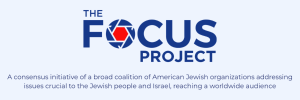
![]()
STAY INFORMED – TALKING POINTS – ACTIONS TO CONSIDER – STORIES MAKING NEWS
![]()

Israeli Oct. 7 Survivor Excels at European Song Contest: ‘I won at life’
The unthinkable happened on the morning of Oct. 7, 2023, when Yuval Raphael was among the many young people celebrating at the Nova music festival. She survived the horrific Hamas massacre by hiding for hours under a pile of dead bodies in a roadside bomb shelter, pretending to be dead. Groups of terrorists fired inside the shelter where she hid, making sure that all the Israelis were indeed dead. Wounded but alive, Raphael had shrapnel in her head and leg:
“Trapped and fearing for my life, I witnessed unspeakable horrors – friends and strangers alike were injured and killed in front of my eyes. When the bodies of those murdered fell on us, I understood that hiding under them was the only way I could survive the nightmare.”
This Nova survivor found strength to overcome her nightmare through singing. Capturing the hearts of her fellow Israelis, she was selected to represent Israel at this year’s Eurovision Song Contest. Raphael embraced “music as one of the strongest ingredients in my healing process. I want to tell them the story of the country, of what I went through, of what others went through. I want to tell the story of standing strong.”
Eurovision is one of the most watched events throughout the world. Last year’s 37-nation competition had more viewers than the Super Bowl.
The 25-year-old singer surprised audiences worldwide when her Oct. 7 tribute song, “New Day Will Rise,” won the competition’s public vote and she finished second overall. Many countries that often are in the news for attacks against Jews and anti-Israel activist rallies, gave the singer high scores. Israel received first-place votes from 12 nations, including Australia, France, the Netherlands, Spain, Sweden and the UK. Only days after the competition, the French and British governments threatened to sanction Israel over its Gaza policies. Spain’s prime minister demanded a review of the votes because he could not understand how Israel received so much support and again called for Israel to be expelled from the contest.
Raphael’s experience in Basel, Switzerland, was another trial of her bravery and resilience, as she faced threats and antagonism wherever she went. She was confronted at the opening parade by a man making a threatening throat-slitting gesture amid a sea of Palestinian flags. Protesters burned the American and Israeli flags at an illegal demonstration and two British activists attempted to storm the stage during her final performance.
Choosing to spread joy over hate, a thrilled Raphael stated: “We’re going to celebrate! We’re going to celebrate and we’re going to breathe. I feel like we’ve won at life. I’ll be grateful for this situation every day of my life. I’ll be grateful for our nation every day of my life. All I wanted to do was bring honor and pride to this country, to make them proud, to give them a small second of peace amid all the madness.”
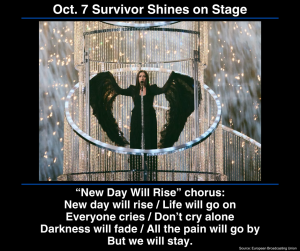
Overcoming Oct.7 Trauma: ‘Make people understand without words’
Andrei Kozlov also uses art to help him heal from the physical and psychological abuse he suffered while in captivity. The Israeli Defense Forces rescued him after 246 days. The 27-year-old Russian Israeli used a pencil and notepad to sketch in Gaza: “They had moved us to another place and already taken off our chains. I started to draw something from my imagination, my interpretation of my experience. I drew about how I would feel when I would be set free.”
Now, Kozlov paints “to show what happened and have people understand it without words. There are thousands of survivors from Oct. 7, and some of them haven’t been able to move forward. I’m thankful and grateful that I got out of there, but I’m not stuck on it. By accident, I became a symbol of hope. I have a second chance. I need to use it.” His artwork is being exhibited in NYC.
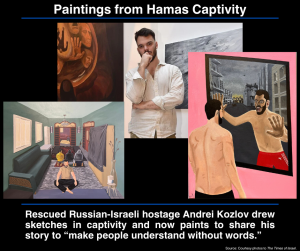
50,000 Supporters Marched for Israel: ‘Israelis are not alone’
Kozlov was one of six former hostages who participated in NYC’s Israel Day parade. American Ruby Chen, whose son Itay is believed to be dead and his body still held by Hamas: “I am glad to be here seeing the support of tens of thousands who stand behind the hostage families, which include four U.S. citizens.” Iran-backed Hamas terrorists still hold 58 hostages captive; at least 34 are dead, including the four Americans.
The annual Israel Day event began in 1965 and this year’s theme was Hatikvah – Hebrew for “the hope” and the name of Israel’s national anthem. The theme was echoed by Israel’s supporters. Daniel Rother of Teaneck, NJ: “As Jews we always have hope. We must have hope that the remaining hostages will be returned soon to their families. We must hope that the world will understand that Israel genuinely desires to live in peace. We must have hope that tomorrow will be different.” High school student Leah Barzideh: “Seeing all of these people unite and show so much joy and love for Israel was truly special.”
Ofir Akunis, the Israeli consul general in NY: “The Israel Parade is a clear expression of the enormous support from all Jewish communities and a very large segment of the American public for our country. It is also the definitive response to all the terror supporters in the city. While they burn American and Israeli flags, we proudly wave them.”
NYPD counter terror and intelligence teams secured the parade. The next day, Mayor Eric Adams announced the creation of the New York City-Israel Economic Council that will “strengthen economic ties, promote innovation, create jobs and strengthen the unbreakable bond between our two governments.”
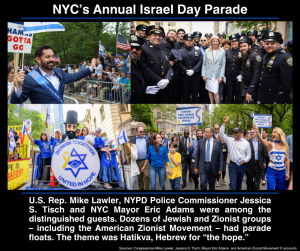
![]()

![]()

Show your solidarity with Israel and counter hatred of Jews

Across generations, Jewish Americans have shown up with grit, leadership, and a deep commitment to the country. Jewish Americans have made meritorious contributions to the U.S. military from the nation’s founding and helped to lay the foundations of America’s success today.
Here are a few other notable Jewish Americans who served in the U.S. military, each recognized for their service and impact:
Want to learn more? Here are some actions to consider and ways to get involved:
How do you JAHM? Whether it’s reading a book by your favorite Jewish American author, watching a Mel Brooks comedy, or cooking Molly Yeh’s latest recipe, we want to know how you JAHM! When you post, use the hashtags #MyJAHM and #OurSharedHeritage to connect to the national celebration.
Click here to access the JAHM toolkit full of resources, posters, social media graphics and more!
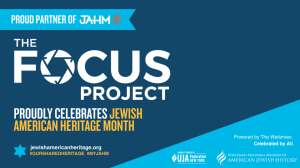
![]()

Trump’s Mid East Trip Leaves More Questions Than Answers for U.S. and Israel
President Trump’s whirlwind regional trip dealt with many Israeli and American concerns: Qatar, Saudi Arabia, Iran, Syria, Lebanon, Yemen and the Palestinians. While the president’s acceptance of a Qatari jet to temporarily serve as Air Force One received an enormous amount of attention, Trump announced a weapons deals with Qatar – leaving many in Congress on both sides of the aisle troubled by his decision making. However, Trump summarized his trip as “very good for Israel.” However, a new report revealed that the Qatar lobby reaches deep into the U.S. conservative media – including Tucker Carlson – as the Qatari government continues to conduct foreign influence operations.
An explosive report in the Wall Street Journal revealed that Iran-backed Hamas launched the Oct. 7 attacks in part to prevent Saudi Arabia from normalizing relations with Israel. Trump signed a $142 billion arms with the Saudis and told them that they can join the Abraham Accords when they are ready.
The U.S. president announced an end to sanctions on Syria and urged its new leaders to join the Abraham Accords. There were reports that the Israelis and Syrians were talking, but the end of sanctions sparked concerns in Israel as Al Qaeda’s dream for sanctions relief came true.
President Trump stated that America and Iran are “getting close to a deal” on the Islamic Republic’s nuclear weapons program as the regime continues to enrich uranium and vows to never end its program. Trump demanded that Iran stop supporting its proxy terror groups and end enrichment as part of a new deal. The U.S. Treasury Dept. sanctioned Iran-backed Hezbollah financiers in Lebanon and Iran. The Iran-backed Houthis continued launching missiles into Israel and the IDF responded with more airstrikes, after Trump recently reached an understanding with the Houthis.
A new Palestinian-run survey revealed that 87% of Palestinians think “Hamas did not commit the atrocities seen in the 10/7 videos shown by international media.” Also, 77% oppose disarming Iran-backed-Hamas, and the Palestinians prefer that Hamas or jailed terrorist leader Marwan Barghouti lead the Palestinian Authority. A Palestinian terrorist killed a pregnant Israel mother in the West Bank en route to the hospital to give birth. Israelis responded to her death by torching 15 Palestinian vehicles. 81% of Israeli Jews fear a 10/7-style attack from the West Bank.
The Israeli prime minister announced that Israel will begin allowing “basic” humanitarian aid into Gaza after President Trump days earlier stated that “a lot of people are starving in Gaza.” Israel is also exploring a deal to end the war, return all its hostages and exile Hamas terrorists. The Committee to Protect Journalists reported that Gazan journalists are “intimidated, threatened and assaulted by Hamas.”
Stories Impacting American Jews
Stories From Around the World
![]()
CLICK BELOW TO ACCESS ADDITIONAL FOCUS PROJECT RESOURCES:
Want to Read More of Our Talking Points?
Did you miss a recent edition of The Focus Project? No need to search your inbox. Our most recently published editions are available on our website.
![]()

This content is developed by The Focus Project in partnership with MERCAZ USA. The Focus Project distributes weekly news and talking points on timely issues concerning Israel and the Jewish people, including antisemitism, anti-Zionism and the delegitimization of Israel. It represents a consensus view across a spectrum of major American Jewish organizations. MERCAZ USA recognizes and respects the diversity of views on these issues among its readers and the community at large.
![]()